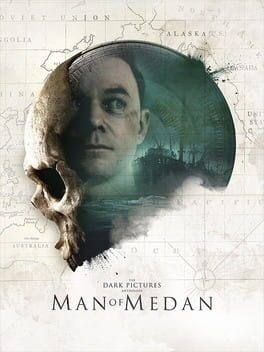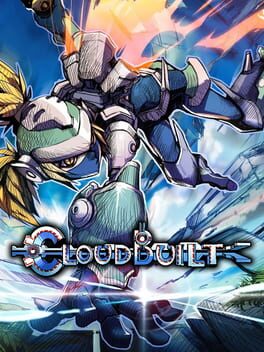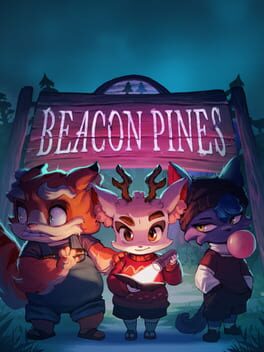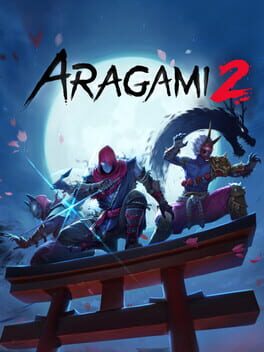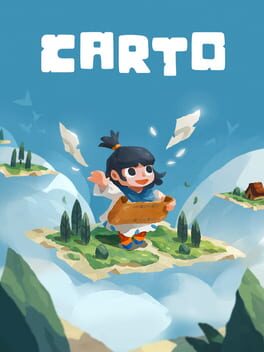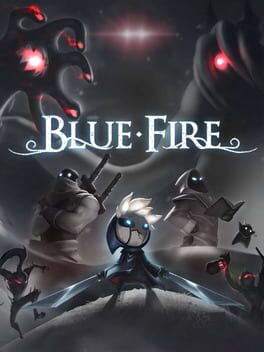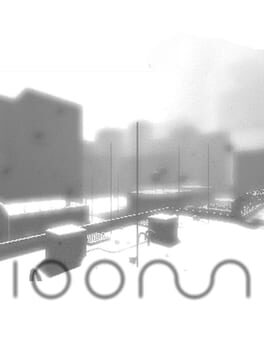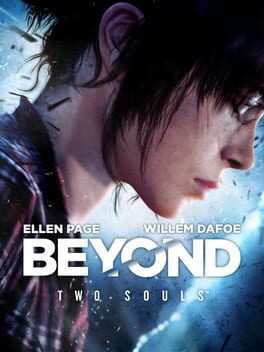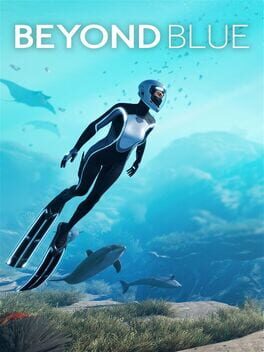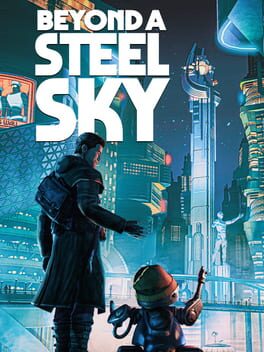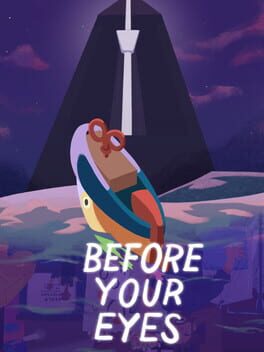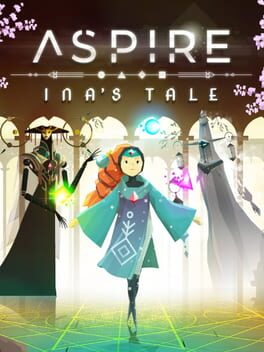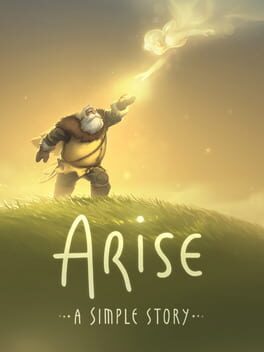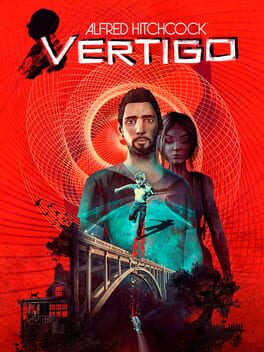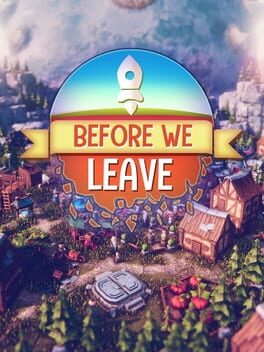TidB
A game about choices that doesn't understand their role in storytelling. A horror game that doesn't understand horror. A game that concludes a decent setup with an embarrassing ending.
The first half is bursting with jump scares, even the extremely silly ones where a deformed face screams at you directly, giving this high-budget game the feel of a free Unity horror game. We get some actual breathing room towards the end but at the same time the jump scares that still do occur destroy any leftover atmosphere. This is worsened by a dumbed-down narrative. The Storyteller is a childish addition, the archetype of a mysterious meta person who's above the narrative. His sole contributions are nebulous predictions and a patronizing pat on the back if you managed to save people - and maybe he reprimands you if someone died. I wouldn't know, I didn't bother to check any more endings.
And y'know, I got to my first ending and it sucked ass - a completely unexplained conflict suddenly emerged for that shitty 'ooooOOOoooo the evil thing is still out there' moment. I redid a dumb decision I made towards the end and saved everyone, but that ending is almost exactly the same and it still sucked ass. I even watched an ending compilation and they all sucked ass. If I let someone escape early and then save everyone else later on, why does that first someone come back to the spooky ghost ship alone and they don't even try to call each other before, while in the other endings he returns obviously not alone?
As often present in horror media, there's an ideology of nihilism where mostly bad things simply happen and you're forced to live with them. This cheap trick has little bearing because death can be thrown in at any time. Even worse, the game later tries and fails to rationalize the spooky happenings instead of staying with a purely supernatural explanation. As seen before in The Suicide of Rachel Foster, rationalization does not make horror more grounded, believable or impactful.
So what bearing do your choices have in the end? In a good narrative or even your local DnD campaign, the entire world changes with you. Here, there are binary choices: you survive or you don't. There is no moral, there is no larger point, character arcs begin and get thrown away. There's only a bunch of cutscenes with no emotional release. The gamification of the narrative can be seen by people commenting on how shocked they were when an early innocuous decision has grave consequences later on. One person even said that the storyteller is their favorite character. He's not a character, he's the writer's desperate attempt to give a nihilistic narrative an even more nihilistic twist.
Games like this are built on the belief that there's always a choice, but this one doesn't have an answer to any of them. As The Armed sang not so long ago:
Expectations, secret rattlesnakes
It’s never really how it happens
It’s never really how it happens
The first half is bursting with jump scares, even the extremely silly ones where a deformed face screams at you directly, giving this high-budget game the feel of a free Unity horror game. We get some actual breathing room towards the end but at the same time the jump scares that still do occur destroy any leftover atmosphere. This is worsened by a dumbed-down narrative. The Storyteller is a childish addition, the archetype of a mysterious meta person who's above the narrative. His sole contributions are nebulous predictions and a patronizing pat on the back if you managed to save people - and maybe he reprimands you if someone died. I wouldn't know, I didn't bother to check any more endings.
And y'know, I got to my first ending and it sucked ass - a completely unexplained conflict suddenly emerged for that shitty 'ooooOOOoooo the evil thing is still out there' moment. I redid a dumb decision I made towards the end and saved everyone, but that ending is almost exactly the same and it still sucked ass. I even watched an ending compilation and they all sucked ass. If I let someone escape early and then save everyone else later on, why does that first someone come back to the spooky ghost ship alone and they don't even try to call each other before, while in the other endings he returns obviously not alone?
As often present in horror media, there's an ideology of nihilism where mostly bad things simply happen and you're forced to live with them. This cheap trick has little bearing because death can be thrown in at any time. Even worse, the game later tries and fails to rationalize the spooky happenings instead of staying with a purely supernatural explanation. As seen before in The Suicide of Rachel Foster, rationalization does not make horror more grounded, believable or impactful.
So what bearing do your choices have in the end? In a good narrative or even your local DnD campaign, the entire world changes with you. Here, there are binary choices: you survive or you don't. There is no moral, there is no larger point, character arcs begin and get thrown away. There's only a bunch of cutscenes with no emotional release. The gamification of the narrative can be seen by people commenting on how shocked they were when an early innocuous decision has grave consequences later on. One person even said that the storyteller is their favorite character. He's not a character, he's the writer's desperate attempt to give a nihilistic narrative an even more nihilistic twist.
Games like this are built on the belief that there's always a choice, but this one doesn't have an answer to any of them. As The Armed sang not so long ago:
Expectations, secret rattlesnakes
It’s never really how it happens
It’s never really how it happens
2014
A good fast-paced platformer. It's nice to see ongoing support, new levels added and revamped, and a lot of built-in features like a map editor, leaderboards and modifiers. The movement is generally fast (though you can also take it slow) but not as smooth as I would've liked, because some actions are context-sensitive or done automatically, like grabbing ledges and the same button being used for dashing and boosting along a wall, which has a slight delay when switching between those actions (or possibly, a skill issue on my side). Still overall pretty enjoyable with large levels, multiple routes and lots of new ideas. From here, I'd recommend playing DeadCore (my beloved) and Valley (if you want more story).
2022
It's like reading a Three Investigators book. A well-crafted mystery but on its own, you won't remember much of it. It's well-rounded, but a bit too round. A good cast of characters, a semi-intriguing mystery with a few nice twists, good art, digestible dialogue, and meta-storytelling including the branching narrative gimmick... It almost pains me to mechanically list all these features as if I'm trying to describe the features of an accounting software, but there's not much thematic depth to it, maybe because it has so much breadth: memories, dead and missing parents, issues with your parents, issues between your parents, issues between friends, environmentalism and power, but they're merely means to advance the plot.
I wanted to write about a comparison with Carto, the predictable heart-to-heart conversations between children and the story branching, but I don't feel strongly enough about it. This is a rather fun story, but it won't change your life. Apart from making you a furry (which I approve of).
I wanted to write about a comparison with Carto, the predictable heart-to-heart conversations between children and the story branching, but I don't feel strongly enough about it. This is a rather fun story, but it won't change your life. Apart from making you a furry (which I approve of).
2021
"No." That's my thought as I finished my last mission of the game. I just completed Chapter 3, I'm 19 missions in, and completely exhausted. I check the achievement list and there are 9 chapters in total. 51 missions. That's when I abandoned this content mill of a game.
It's hard to describe the repetitiveness, the lack of anything memorable so let's start with the most obvious issue: the 19 missions I played took place on 6 unique maps in total. Four maps were played quadruply, one map twice, one lucky map just once. Not many changes happen to the maps between the missions apart from the objective. Especially for my slower playstyle with lots of carefully knocking out and hiding enemies, it's atrocious to return to an area that you cleared in a previous mission that's now sprawling with them. Four times. On four maps.
Hey, it still could've been good. Unfortunately, even ignoring the inane repetition, the missions themselves aren't good either. There's one I distinctly remember: The map had two main areas. Unsure where to go, because the marker only appears when you're already rather close to the objective, I headed for one of the areas and knocked out everyone there - oh hey, one specific dangerous (now unconscious) enemy holds a quest item I can pick up! But apparently, I still need to to talk to an informant on the other side of the map. He says I gotta pick up this quest item (ok cool i'm so ahead of you) and kill the dangerous enemy - so let's run back to the guy, kill him, then run back to the informant for some reason, and then end the mission. Fun...? The newest Hitman trilogy had me repeating the same map over twenty times (voluntarily!) and it worked because the levels had incredible intricacy, which Aragami with its limited resources can't reach at all with its mere changes to enemy placements that you barely even notice.
It's obviously optimized for coop so maybe it'll be a blast there (which is the very least a coop mode can do), but the singleplayer experience is tragic. At first, I thought it would be more story-based like its predecessor, but after getting bombarded with a whackier world, giant tutorial screens straight out of 2014 (I know what parrying is thank you very much) and a very gamified experience, it was quite clear that this is a game game. Everything you know is in there - a skill tree? Crafting (which is actually just buying stuff at the store)? A hub world? Cosmetics? MORE cosmetics??? This game was stretched as far as possible. It has an achievement for skipping a cinematic, and 60% of players got it.
This is the first game I abandoned. I played worse games, but for shorter. Playing Aragami 2 feels like reading one of those spam SEO blog posts where all the paragraphs are the same but worded slightly differently. Play literally any other stealth game instead.
It's hard to describe the repetitiveness, the lack of anything memorable so let's start with the most obvious issue: the 19 missions I played took place on 6 unique maps in total. Four maps were played quadruply, one map twice, one lucky map just once. Not many changes happen to the maps between the missions apart from the objective. Especially for my slower playstyle with lots of carefully knocking out and hiding enemies, it's atrocious to return to an area that you cleared in a previous mission that's now sprawling with them. Four times. On four maps.
Hey, it still could've been good. Unfortunately, even ignoring the inane repetition, the missions themselves aren't good either. There's one I distinctly remember: The map had two main areas. Unsure where to go, because the marker only appears when you're already rather close to the objective, I headed for one of the areas and knocked out everyone there - oh hey, one specific dangerous (now unconscious) enemy holds a quest item I can pick up! But apparently, I still need to to talk to an informant on the other side of the map. He says I gotta pick up this quest item (ok cool i'm so ahead of you) and kill the dangerous enemy - so let's run back to the guy, kill him, then run back to the informant for some reason, and then end the mission. Fun...? The newest Hitman trilogy had me repeating the same map over twenty times (voluntarily!) and it worked because the levels had incredible intricacy, which Aragami with its limited resources can't reach at all with its mere changes to enemy placements that you barely even notice.
It's obviously optimized for coop so maybe it'll be a blast there (which is the very least a coop mode can do), but the singleplayer experience is tragic. At first, I thought it would be more story-based like its predecessor, but after getting bombarded with a whackier world, giant tutorial screens straight out of 2014 (I know what parrying is thank you very much) and a very gamified experience, it was quite clear that this is a game game. Everything you know is in there - a skill tree? Crafting (which is actually just buying stuff at the store)? A hub world? Cosmetics? MORE cosmetics??? This game was stretched as far as possible. It has an achievement for skipping a cinematic, and 60% of players got it.
This is the first game I abandoned. I played worse games, but for shorter. Playing Aragami 2 feels like reading one of those spam SEO blog posts where all the paragraphs are the same but worded slightly differently. Play literally any other stealth game instead.
2020
Hey, that's pretty good! A well-designed adventure puzzler with flawless execution. It doesn't ever get hugely challenging, but stays interesting by constantly adding new twists to the main mechanic. It's thematically simple as well, but doesn't stray too far into kitsch territory, mainly because everything has a purpose - you're not just taking in the sights of forests and deserts and mountains, you interact with them. And the game knows exactly where and when to end - this is some masterful control of pacing. You never feel bored or overloaded, and after finishing, it just feels complete - as always, I hoped for a thematic conclusion, but in such a case it's not necessary. Cute and well-rounded.
2021
A bit unfortunate, isn't it. Even though you won't be fazed by its pretty standard fantasy world and story, the basis of collecting stronger items and abilities and zooming through earlier areas without many problems is solid. The main problem is the level design, and it unfortunately affects everything.
The foundation is good: you got multiple large and visually distinct levels, a few hubs, a few teleports, lots of opportunities. But it's all so awkwardly placed that you spend a lot of time traversing the same areas. Even worse, all the areas within a level look the same. I couldn't for the life of me recall any routes or locations which makes navigation actually terrible. This is then aggravated by a bunch of quests that have you revisit old locations to collect or activate things which would be okay in any other game, but here you really turn your brain off; especially because the goals often aren't interesting - open a chest to get a key to access an area to get an even better key to access something we're actually interested in, but you then need to activate three more things (one of which needs four more things to be activated).
It made me think about fantasy as a genre though, because I thought it wasn't my favorite genre anyway, and when Blue Fire started in a castle, with gods, some evil shadowy corruption, magicians, 'you're the chosen one' etc etc, I prepared myself for something thematically uninteresting. I thought that was unfair (it is), but now that I think about it, I don't dislike fantasy as a genre - it's just not an interesting starting point for me. It can certainly be good: either by including more unconventional elements (Bastion, Hades, Wandersong, Everhood) or just having a solid thematic basis apart from it (Final Fantasy, Dreamfall, Everhood again). Blue Fire has neither. Root of the problem is the inconsistent tone, where the main story is about corrupted gods and the death of the entire land, while the inhabitants seem to be mostly just fine, maybe a bit bothered by the monsters. It's so whimsical, but not in a controlled manner like in A Hat in Time. It feels like the world you're traversing has always been this way and it's alright how it is, and your quests are totally separate.
Even if we ignore the lack of thematic depth and level design issues, at its best it would just be a mediocre game about things you've already seen with gameplay you've already experienced. Just play A Hat in Time or Supraland instead.
The foundation is good: you got multiple large and visually distinct levels, a few hubs, a few teleports, lots of opportunities. But it's all so awkwardly placed that you spend a lot of time traversing the same areas. Even worse, all the areas within a level look the same. I couldn't for the life of me recall any routes or locations which makes navigation actually terrible. This is then aggravated by a bunch of quests that have you revisit old locations to collect or activate things which would be okay in any other game, but here you really turn your brain off; especially because the goals often aren't interesting - open a chest to get a key to access an area to get an even better key to access something we're actually interested in, but you then need to activate three more things (one of which needs four more things to be activated).
It made me think about fantasy as a genre though, because I thought it wasn't my favorite genre anyway, and when Blue Fire started in a castle, with gods, some evil shadowy corruption, magicians, 'you're the chosen one' etc etc, I prepared myself for something thematically uninteresting. I thought that was unfair (it is), but now that I think about it, I don't dislike fantasy as a genre - it's just not an interesting starting point for me. It can certainly be good: either by including more unconventional elements (Bastion, Hades, Wandersong, Everhood) or just having a solid thematic basis apart from it (Final Fantasy, Dreamfall, Everhood again). Blue Fire has neither. Root of the problem is the inconsistent tone, where the main story is about corrupted gods and the death of the entire land, while the inhabitants seem to be mostly just fine, maybe a bit bothered by the monsters. It's so whimsical, but not in a controlled manner like in A Hat in Time. It feels like the world you're traversing has always been this way and it's alright how it is, and your quests are totally separate.
Even if we ignore the lack of thematic depth and level design issues, at its best it would just be a mediocre game about things you've already seen with gameplay you've already experienced. Just play A Hat in Time or Supraland instead.
2023
A blindingly bright sun sharpens and softens the silhouette of a cityscape. Short trips under the surface show its inner workings, illuminated artificially and by sunlight piercing through perforations in the hull. It does feel like a walk around the city during a cold clear winter day, the infinite blue sky replaced by a brightness your eyes can't adjust to, the details of the structures so bright and detailed they become abstract.
I'm not very familiar with Oliver Shore's work - I've been introduced to it by NaissanceE and some shared ideas are certainly present here, but it feels less mysterious and oppressive, more playful even, more intimate and person-scaled. Interesting is the use of transparent, organic and sometimes living shapes that seem to be an important motif in the author's work, but I frankly don't know enough about it.
It obviously is very abstract and short - and inspirational. I'll think about how it's using the sun, shadows and most surprisingly aliasing - the very low resolution forcing jagged edges, broken lines and moire effects on you; an unwanted artifact with hundreds of man-hours spent on researching and eliminating it given a new role. Why not give the unwanted another chance - let's take a walk beneath the highway in the sky.
I'm not very familiar with Oliver Shore's work - I've been introduced to it by NaissanceE and some shared ideas are certainly present here, but it feels less mysterious and oppressive, more playful even, more intimate and person-scaled. Interesting is the use of transparent, organic and sometimes living shapes that seem to be an important motif in the author's work, but I frankly don't know enough about it.
It obviously is very abstract and short - and inspirational. I'll think about how it's using the sun, shadows and most surprisingly aliasing - the very low resolution forcing jagged edges, broken lines and moire effects on you; an unwanted artifact with hundreds of man-hours spent on researching and eliminating it given a new role. Why not give the unwanted another chance - let's take a walk beneath the highway in the sky.
2013
Too much ambition and budget result in an amateur hour movie. I always wanted to experience a David Cage game for myself instead of parroting online opinions. I planned to play Heavy Rain in the future, but after this experience it'll be a very low priority. Why's that?
At first, I was actually pleasantly surprised. The technical details are working pretty well - all the animations are good, the facial expressions are a bit above the uncanny valley, and the QTEs are done fairly organically, usually best in the slow-mo sequences where you don't get a real prompt most of the time. All of this made it better than Vertigo, despite the only occasionally awkward controls.
The problem: It just gets bloated beyond (ha!) recognition, which really becomes apparent halfway through. Why are there so many mundane tasks? Why is there a fake parents plot? Why are there four separate instances of Ryan asking me out? Why does Aiden vanish for some time towards the end for no reason and then come back? I always appreciate not having to deal with writers killing everything but why have the gap at all? Why is there a horrible final choice once again? Why is 'love' for some reason the most important lesson learned for Jodie? What the hell are these random-ass partner options for spending my future life with?
In addition to the already long main narrative, three giant interludes teach you little about the world and yourself. The Navajo part is probably the nicest because of the change of scenery, but it merely tells you that portals to the infraworld exist. The homeless part teaches you in a grotesque birthing scene that Jodie can rely on herself, independent from Aiden. The military operation... doesn't teach you anything apart from that the CIA might be bad! (wow!) And that your actions have consequences! Other parts are just not set up properly, such as the suicidal moments supposedly caused by Jodie thinking that she's cursed. She kinda is, but not by Aiden - by the powers that are trying to use her, and the resolution is unclear. Similar story with Cole, who is a happy tag-along who has no agency besides caring about Jodie.
I wonder if a lot of the bloat is caused by the vocal demand for 'content', a nebulous term that's often used in low-quality reviews, most often in respect to 'playtime' - an easy quantifier that you can weigh against the cost of the game, where more content = longer playtime = better game. I strongly dislike how these terms are used in the area of narrative games, especially in conjunction with 'replayability' - an artifact left from the games without a narrative focus. The game does not only appeal to gamers in this way, but also by trying to be too direct, not at all trying to go on a more abstract or poetic layer, everything is spelled out exactly for you; both gameplay- and narrative-wise.
The entire non-linear storytelling shtick quickly evaporates because it's more dizzying than interesting. There are way too many segments and jumps. The intention was probably that watching Jodie grow up and go through the experiments etc would be boring - but the solution to that is not this random assembly of plot sections, it is to fix the original linear story. You can use such a technique rarely, like for the in medias res beginning. Or if you have skill. The only other narrative use for it is hiding the reason for the manhunt that you flee from in the beginning which is alright, but then the actual reveal happens in the aforementioned overly long military pseudo-stealth sequence in a horrific way.
And what's the message? Just run away? I'm not suggesting that Jodie is supposed to personally fight against all the world's militaries that are trying to use the infraworld for themselves, but simply leaving after you already did their dirty jobs twice isn't quite satisfying either. Nathan's fate, a sudden villain to be pitied, doesn't get set up properly either and gets resolved way too quickly. A shame, because the final set piece of approaching the Black Sun is quite nice.
Overall, it's actually not the most terrible thing - but the whole ambition and budget should really have produced something better. And probably smaller. Just play Transistor instead.
At first, I was actually pleasantly surprised. The technical details are working pretty well - all the animations are good, the facial expressions are a bit above the uncanny valley, and the QTEs are done fairly organically, usually best in the slow-mo sequences where you don't get a real prompt most of the time. All of this made it better than Vertigo, despite the only occasionally awkward controls.
The problem: It just gets bloated beyond (ha!) recognition, which really becomes apparent halfway through. Why are there so many mundane tasks? Why is there a fake parents plot? Why are there four separate instances of Ryan asking me out? Why does Aiden vanish for some time towards the end for no reason and then come back? I always appreciate not having to deal with writers killing everything but why have the gap at all? Why is there a horrible final choice once again? Why is 'love' for some reason the most important lesson learned for Jodie? What the hell are these random-ass partner options for spending my future life with?
In addition to the already long main narrative, three giant interludes teach you little about the world and yourself. The Navajo part is probably the nicest because of the change of scenery, but it merely tells you that portals to the infraworld exist. The homeless part teaches you in a grotesque birthing scene that Jodie can rely on herself, independent from Aiden. The military operation... doesn't teach you anything apart from that the CIA might be bad! (wow!) And that your actions have consequences! Other parts are just not set up properly, such as the suicidal moments supposedly caused by Jodie thinking that she's cursed. She kinda is, but not by Aiden - by the powers that are trying to use her, and the resolution is unclear. Similar story with Cole, who is a happy tag-along who has no agency besides caring about Jodie.
I wonder if a lot of the bloat is caused by the vocal demand for 'content', a nebulous term that's often used in low-quality reviews, most often in respect to 'playtime' - an easy quantifier that you can weigh against the cost of the game, where more content = longer playtime = better game. I strongly dislike how these terms are used in the area of narrative games, especially in conjunction with 'replayability' - an artifact left from the games without a narrative focus. The game does not only appeal to gamers in this way, but also by trying to be too direct, not at all trying to go on a more abstract or poetic layer, everything is spelled out exactly for you; both gameplay- and narrative-wise.
The entire non-linear storytelling shtick quickly evaporates because it's more dizzying than interesting. There are way too many segments and jumps. The intention was probably that watching Jodie grow up and go through the experiments etc would be boring - but the solution to that is not this random assembly of plot sections, it is to fix the original linear story. You can use such a technique rarely, like for the in medias res beginning. Or if you have skill. The only other narrative use for it is hiding the reason for the manhunt that you flee from in the beginning which is alright, but then the actual reveal happens in the aforementioned overly long military pseudo-stealth sequence in a horrific way.
And what's the message? Just run away? I'm not suggesting that Jodie is supposed to personally fight against all the world's militaries that are trying to use the infraworld for themselves, but simply leaving after you already did their dirty jobs twice isn't quite satisfying either. Nathan's fate, a sudden villain to be pitied, doesn't get set up properly either and gets resolved way too quickly. A shame, because the final set piece of approaching the Black Sun is quite nice.
Overall, it's actually not the most terrible thing - but the whole ambition and budget should really have produced something better. And probably smaller. Just play Transistor instead.
2020
You know... good intentions and all, but it actually manages to surpass Abzu even though it's a much tamer, less artsy, more narratively confused version. That's pretty much it, the game is a thin abstraction layer over an ocean documentary which unsurprisingly is interesting. As such, it's not to be treated as a normal game, but rather a science communication device which it does well enough - but still leaves you yearning for more, because... well if you just connected it to Abzu's artistic direction (Beyond Blue isn't like hard, current science anyway) and an actual narrative, it could just achieve the goal that itself mentions right at the start: if you could anchor whales in our culture, then maybe we could save them.
2020
A tale of media illiteracy.
You see signs of the game not trusting the player to understand information very early on - it encourages you to ask the same thing multiple times to really make sure that you know what you need to do (on top of the existing hint system), but the answers only change slightly each time, creating a lot of repetition. Especially early on, your character is bewildered by pretty much everything and has to ask the most obvious things - and this is not related to the trope of an outlander coming to a high-tech area. You initially think nothing of it, assuming they were just quirks of the devs trying to help you.
But it just gets worse. As the tension builds up, you come to an incredibly disappointing Marvel-esque cutscene that makes absolutely no sense, is completely avoidable and foreseeable and ends with, of course, a sacrifice and a tearful goodbye. It does literally nothing for the story, no character arc has been changed, nothing in the world is different.
The actual ending is what broke me. The idea of man vs machine, empathy vs logic, and the interpretation of happiness is not new - in fact it's a mainstay of the sci-fi genre (though at least we avoided the ubiquitous utilitarianism topic for today). And this game presents an absolutely naive interpretation of it. Firstly, it concludes at 'this one specific obviously bad way of making everyone happy is not good', without challenging the innate notion of happiness being the end goal. Secondly, and most importantly, the end sequence is literally you using the power of logic against a machine that for some reason didn't see the issues with its own bad logic. You, the player, don't even get to think - you just solve the kid's version of a rubik's cube and the protagonist automatically does the arguing for you - no thinking necessary! In an even more child-like manner, the different opponents you defeat using the power of logic cower and disappear (forever), and the antagonist then... dies for some reason.
Why is this so childish? This the dream sequence, the l'esprit de l'escalier of rational™ people - that your opponents will listen to you, you have all the answers, and your opponent will then back down because your power of logic is just too strong. In a way, you can interpret it as a hopeful appeal to democracy, to activists who can change the minds of the people in charge. But while that's true to some extent, in reality it's more than a single person happening to just... go to the people in charge (which nobody else did) with a perspective from outside (because everyone inside is brainwashed) and the people just listen and accept whatever you say (because they were solely in charge because they think they're doing what's best for everyone, even if they're wrong).
Overall, the Obvious Bad Thing (kidnapping children) that happened at the beginning and is the motivation for the entire journey turns out to be... not really connected to the overarching theme. It's not actually pivotal to anything that's happening in the city, it's explained away in a single line. Even worse, it provides the protagonist a counterargument for the previous battle using the power of logic - so it can't even challenge its own assumptions labelled as 'bad' on a fundamental level, it has to resort to things that the writers themselves made up. This also applies to the apparent resource exploitation of another city which, if you haven't played the previous game, gets mentioned one or two times tops - the theme doesn't imply such an exploitation must happen, but it provides an argument because otherwise you couldn't have easily defeated an opponent using the power of logic.
At least it covers the theme of a social credit system, but to a very limited extent. What happens as the citizens get infinite Qdos (their social credit system) and are basically freed? We don't know, it doesn't get explored. Neither do we get even a hint of discussion that human governance (after defeating the evil robots) isn't great either - at most by looking back at 'the old city' (bad) but it doesn't get explained, maybe it was in the prequel game.
I feel like I keep writing about games that do boring interpretations of their themes, but I never see a base version of them done well. I do wonder if I have to give some older game or media credit for that, but I don't think I've played/read/watched them then. At the same time, it feels cheap to recognize a genre mostly because of themes that I often identify as lazy. Maybe we're just beyond that, and this game is from 2020 anyway.
I still do appreciate its creative hacking games, the voice acting and actually the more interesting faces of the people you meet - literally. Its tone is also fun, which kind of excuses its random quirks.
Just like Ghostrunner, it has some okay gameplay which might be worth its while but the pure disrespect shown towards the player during the thematic conclusion makes it unworthy of recommendation. Play State of Mind or maybe even Whispers of a Machine instead.
You see signs of the game not trusting the player to understand information very early on - it encourages you to ask the same thing multiple times to really make sure that you know what you need to do (on top of the existing hint system), but the answers only change slightly each time, creating a lot of repetition. Especially early on, your character is bewildered by pretty much everything and has to ask the most obvious things - and this is not related to the trope of an outlander coming to a high-tech area. You initially think nothing of it, assuming they were just quirks of the devs trying to help you.
But it just gets worse. As the tension builds up, you come to an incredibly disappointing Marvel-esque cutscene that makes absolutely no sense, is completely avoidable and foreseeable and ends with, of course, a sacrifice and a tearful goodbye. It does literally nothing for the story, no character arc has been changed, nothing in the world is different.
The actual ending is what broke me. The idea of man vs machine, empathy vs logic, and the interpretation of happiness is not new - in fact it's a mainstay of the sci-fi genre (though at least we avoided the ubiquitous utilitarianism topic for today). And this game presents an absolutely naive interpretation of it. Firstly, it concludes at 'this one specific obviously bad way of making everyone happy is not good', without challenging the innate notion of happiness being the end goal. Secondly, and most importantly, the end sequence is literally you using the power of logic against a machine that for some reason didn't see the issues with its own bad logic. You, the player, don't even get to think - you just solve the kid's version of a rubik's cube and the protagonist automatically does the arguing for you - no thinking necessary! In an even more child-like manner, the different opponents you defeat using the power of logic cower and disappear (forever), and the antagonist then... dies for some reason.
Why is this so childish? This the dream sequence, the l'esprit de l'escalier of rational™ people - that your opponents will listen to you, you have all the answers, and your opponent will then back down because your power of logic is just too strong. In a way, you can interpret it as a hopeful appeal to democracy, to activists who can change the minds of the people in charge. But while that's true to some extent, in reality it's more than a single person happening to just... go to the people in charge (which nobody else did) with a perspective from outside (because everyone inside is brainwashed) and the people just listen and accept whatever you say (because they were solely in charge because they think they're doing what's best for everyone, even if they're wrong).
Overall, the Obvious Bad Thing (kidnapping children) that happened at the beginning and is the motivation for the entire journey turns out to be... not really connected to the overarching theme. It's not actually pivotal to anything that's happening in the city, it's explained away in a single line. Even worse, it provides the protagonist a counterargument for the previous battle using the power of logic - so it can't even challenge its own assumptions labelled as 'bad' on a fundamental level, it has to resort to things that the writers themselves made up. This also applies to the apparent resource exploitation of another city which, if you haven't played the previous game, gets mentioned one or two times tops - the theme doesn't imply such an exploitation must happen, but it provides an argument because otherwise you couldn't have easily defeated an opponent using the power of logic.
At least it covers the theme of a social credit system, but to a very limited extent. What happens as the citizens get infinite Qdos (their social credit system) and are basically freed? We don't know, it doesn't get explored. Neither do we get even a hint of discussion that human governance (after defeating the evil robots) isn't great either - at most by looking back at 'the old city' (bad) but it doesn't get explained, maybe it was in the prequel game.
I feel like I keep writing about games that do boring interpretations of their themes, but I never see a base version of them done well. I do wonder if I have to give some older game or media credit for that, but I don't think I've played/read/watched them then. At the same time, it feels cheap to recognize a genre mostly because of themes that I often identify as lazy. Maybe we're just beyond that, and this game is from 2020 anyway.
I still do appreciate its creative hacking games, the voice acting and actually the more interesting faces of the people you meet - literally. Its tone is also fun, which kind of excuses its random quirks.
Just like Ghostrunner, it has some okay gameplay which might be worth its while but the pure disrespect shown towards the player during the thematic conclusion makes it unworthy of recommendation. Play State of Mind or maybe even Whispers of a Machine instead.
2021
I did not have a webcam and tried to click along to my blinks, I certainly got dry eyes now - even though the creators are certainly trying to make you teary-eyed. Emphasis on trying, because even though it's definitely balancing between a happy and too short youth, I didn't feel much. Maybe because it never felt like too much you're missing out on by involuntarily blinking and skipping through time. But also maybe because the tragic moment was introduced well with a nice representation and not just shoved onto you.
I did quite enjoy the subversion of the talented protagonist trope, like an antidote to Eliza, as well as the furry fisherman-turned-Charon. I do wonder about the significance of the Gatekeeper and the stories - if we're told it's okay to be who you are, what is it judging? Is it judging at all? Is the gatekeeper ourselves, some kind of invocation of self-love? But what's the significance of the tower then, along with its transmission towers - I initially thought it's some kind of evil machine sucking your stories out of you and using it to power... something. What’s with furry Charon wanting to turn a profit?
I think I'll go with the self-love interpretation, it's nicer. But maybe more than the game is able to convey.
I did quite enjoy the subversion of the talented protagonist trope, like an antidote to Eliza, as well as the furry fisherman-turned-Charon. I do wonder about the significance of the Gatekeeper and the stories - if we're told it's okay to be who you are, what is it judging? Is it judging at all? Is the gatekeeper ourselves, some kind of invocation of self-love? But what's the significance of the tower then, along with its transmission towers - I initially thought it's some kind of evil machine sucking your stories out of you and using it to power... something. What’s with furry Charon wanting to turn a profit?
I think I'll go with the self-love interpretation, it's nicer. But maybe more than the game is able to convey.
2021
A fine puzzler. Sometimes unintuitive, but even I got through relatively unscathed so it can't be that bad.
I initially wanted to talk about the wishy-washy story, but now I'm not so sure. When is a world merely underexplained, and when does it invite the player to kit it out? It reminds me of Bastion's non-recurring ending: a venture into the unknown out of a mystical contraption, few characters and hints at something bigger. In Ina's case, I think they're trying to get on a more abstract plane too quickly while skipping over what's happening concretely. It's obviously not trying to be a huge worldbuilding effort, and in the scope of a nebulous Architect building a semi-living tower it does well enough, but I still cannot grasp what the purpose of it is. You get all the different puzzle pieces throughout and it's not like they don't fit together, but they're so far apart that you can't begin to tell where they do fit. But it might just be all preference.
At least it does have a relatively upbeat ending, which I appreciate.
I initially wanted to talk about the wishy-washy story, but now I'm not so sure. When is a world merely underexplained, and when does it invite the player to kit it out? It reminds me of Bastion's non-recurring ending: a venture into the unknown out of a mystical contraption, few characters and hints at something bigger. In Ina's case, I think they're trying to get on a more abstract plane too quickly while skipping over what's happening concretely. It's obviously not trying to be a huge worldbuilding effort, and in the scope of a nebulous Architect building a semi-living tower it does well enough, but I still cannot grasp what the purpose of it is. You get all the different puzzle pieces throughout and it's not like they don't fit together, but they're so far apart that you can't begin to tell where they do fit. But it might just be all preference.
At least it does have a relatively upbeat ending, which I appreciate.
The subtitle 'A Simple Story' is very true, so if you have ever played a sad indie adventure, you won't find anything new here. Did you know that your child and your wife and finally yourself dying is sad? In any case, it's aesthetically way ahead of other games (The First Tree among others) and especially early on the time manipulation feels very good to use. I just feel like they missed the opportunity to tie that into the narrative - Timelie did it for example.
In the end, it really just becomes way too kitschy. Play RiME instead, which also uses tropes a bit too hard but ties its gameplay better into the narrative and has a more nuanced metaphorical world. And it's not the constant black-and-white switches between love (good) and sad (bad) while a big bearded man is faceplanting onto the floor for the fiftieth time.
In the end, it really just becomes way too kitschy. Play RiME instead, which also uses tropes a bit too hard but ties its gameplay better into the narrative and has a more nuanced metaphorical world. And it's not the constant black-and-white switches between love (good) and sad (bad) while a big bearded man is faceplanting onto the floor for the fiftieth time.
I did not watch the movie, so I cannot draw comparisons. Treating it as a generic movie adaption, I initially thought that it was okay - an intriguing mystery, and a lot of loose ends that actually get tied up. But in reality, it's underwhelming.
As most movie games, it strikes an unsatisfactory balance between both. The cutscenes are just fine and you wouldn't think twice about them if they were in an action game, but focused like this, all the undecipherable and exaggerated facial expressions, the frequent lack of shot composition, and random camera pans or cuts become more visible - though it at least avoids the uncanny valley. As a game, it unsurprisingly offers running through locations and QTEs, not too exciting either.
I'm not sure about the themes in the game; this is where seeing the movie would've been useful. What sticks out the most is the orchestration by a seemingly all-powerful plain evil person - a background that for some reason also gets explained during the about last ten minutes - and an unquestioned, unwavering belief in memories and their factual accuracy that only superficially gets challenged - oh, your memories are wrong? Just remember harder, then the real factually objectively true events can be reconstructed.
Lastly, I think it's just too long. This is reminiscent of the pacing of Daedalic games, specifically State of Mind, which start out pretty slowly - but at least they pick up pace later. Vertigo stays put and its generally laudable desire to tie up its loose ends starts to feel like a roadblock, explaining everything in detail.
I'd just say to play State of Mind instead - it has superficial similarities regarding the pacing and the annoyingness of the main character, but does it better, plainly speaking. Mainly because it doesn't want to be half a movie.
As most movie games, it strikes an unsatisfactory balance between both. The cutscenes are just fine and you wouldn't think twice about them if they were in an action game, but focused like this, all the undecipherable and exaggerated facial expressions, the frequent lack of shot composition, and random camera pans or cuts become more visible - though it at least avoids the uncanny valley. As a game, it unsurprisingly offers running through locations and QTEs, not too exciting either.
I'm not sure about the themes in the game; this is where seeing the movie would've been useful. What sticks out the most is the orchestration by a seemingly all-powerful plain evil person - a background that for some reason also gets explained during the about last ten minutes - and an unquestioned, unwavering belief in memories and their factual accuracy that only superficially gets challenged - oh, your memories are wrong? Just remember harder, then the real factually objectively true events can be reconstructed.
Lastly, I think it's just too long. This is reminiscent of the pacing of Daedalic games, specifically State of Mind, which start out pretty slowly - but at least they pick up pace later. Vertigo stays put and its generally laudable desire to tie up its loose ends starts to feel like a roadblock, explaining everything in detail.
I'd just say to play State of Mind instead - it has superficial similarities regarding the pacing and the annoyingness of the main character, but does it better, plainly speaking. Mainly because it doesn't want to be half a movie.
2020
Anno's slightly wonkier cousin. It's nice for a while, but gets a bit annoying later on because of some non-intuitive restrictions on what you can build and farm on each island, so at first you try to manage supply chains and then give up and let all items criss-cross everywhere. Interestingly enough, this city builder has a bit of a problem with its ending - space whales are attacking regularly but rarely over the course of your session, and you can build a super-intensive planet-wide energy shield which is pretty cool, or you just build a whale charmer and the game is won. It's not bad, but I'd just say to play Anno (1701) instead and ignore its war mechanics.
